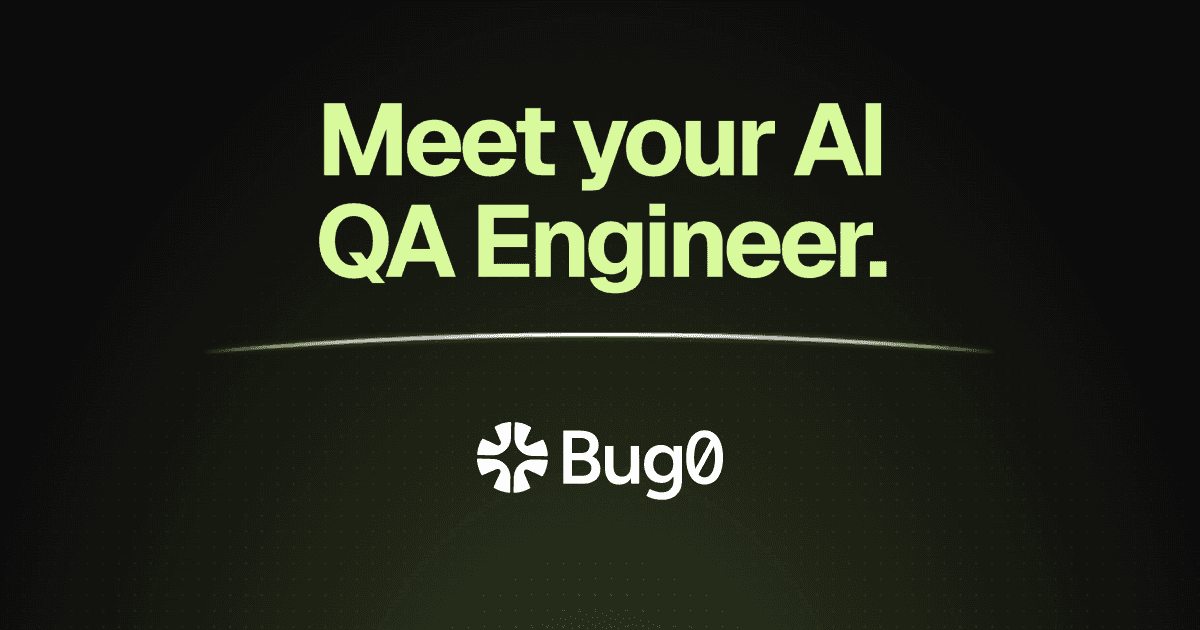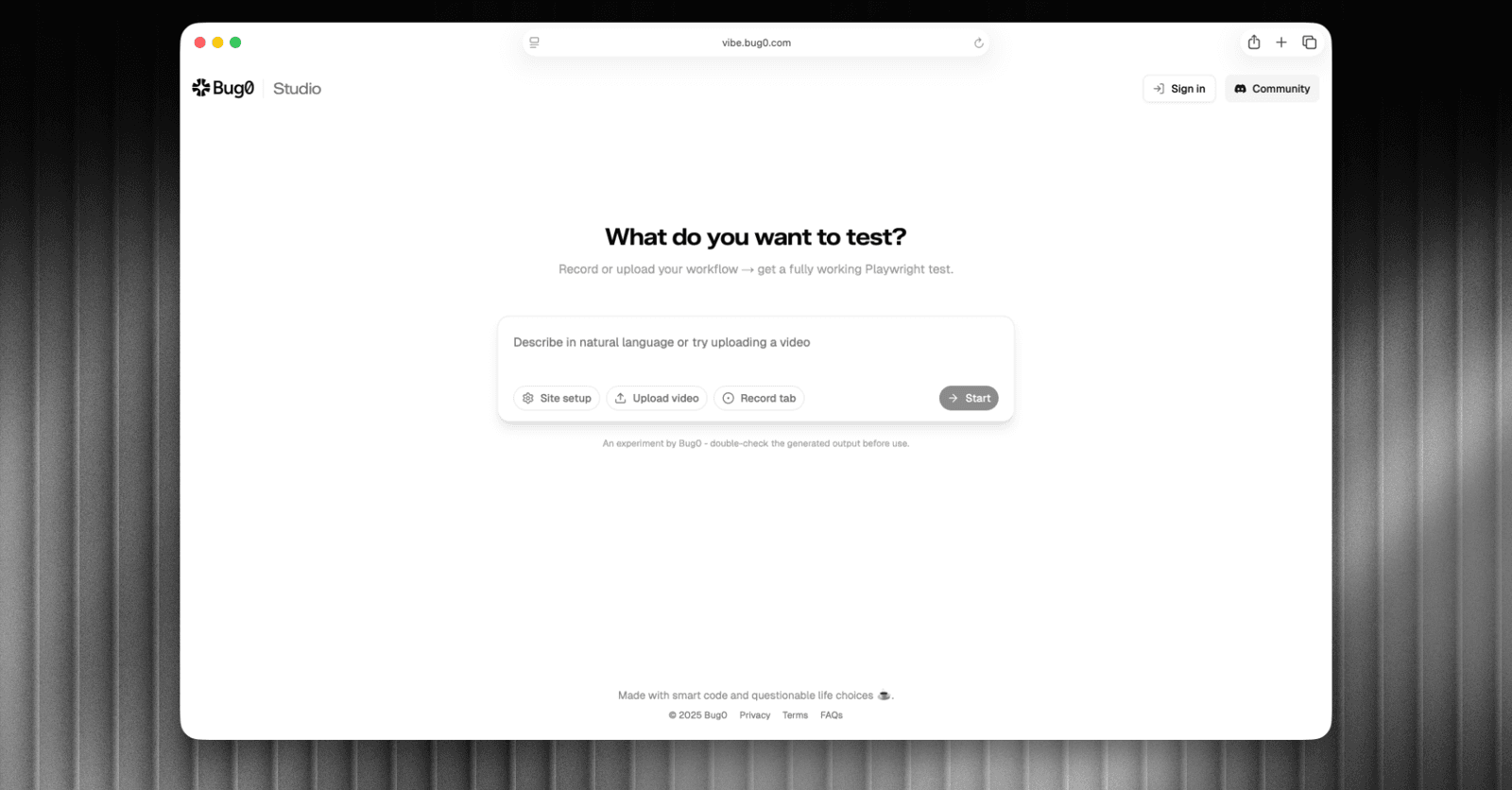Introduction
Playwright has become the testing framework of choice for modern web apps. It's fast, reliable, and developer-friendly. But let's be real, writing and maintaining Playwright tests can still feel like a grind. Flaky selectors, endless scripts, and high setup costs make scaling QA painful. For teams with fast release cycles, this often becomes the biggest bottleneck to shipping confidently.
That's where AI changes the game. By combining large language models (LLMs) with Playwright, developers are reimagining how tests are created, maintained, and run. You can describe a flow in plain English, and AI writes the Playwright code. Agents can navigate apps like humans. Locators adapt when the UI changes. Instead of QA falling behind development, AI now makes it possible for testing to keep up with rapid iteration. Think of it as your AI QA Engineer.
Most people know the big players experimenting in this space. But under the radar, there's a wave of open-source underdogs building clever tools that show where AI + Playwright is headed. These projects may not be production-ready, but they're invaluable signals of what's next. Here are 20 of the most interesting projects you should know about.
Why AI + Playwright Matters
Traditional QA has three major pain points:
-
Slow authoring: hours spent scripting and updating tests, draining developer time.
-
Fragile selectors: every UI tweak breaks them, creating maintenance headaches.
-
Scaling pain: teams and infrastructure costs balloon as test suites grow into the hundreds.
AI + Playwright flips the script:
-
Natural-language automation: describe tests in English, get runnable Playwright code.
-
Self-healing locators: selectors adapt without manual edits, reducing flakiness.
-
Agentic workflows: AI agents explore and test apps like real users, catching issues scripts often miss.
Together, these capabilities point to a future where QA feels like a collaborative partner rather than a bottleneck.
The 20 repos below aren't polished platforms. They're experimental and scrappy, but each reveals a piece of the bigger puzzle of AI-driven testing. Before we dive in, keep in mind these tools cover a wide range, from natural language test generation to full agentic browsers, and together they show how much innovation is happening at the intersection of AI and Playwright.
20 Underdog Open-Source Projects
A. Natural-Language Test Generation

-
Zerostep – Add
ai()to Playwright tests for natural-language actions, queries, and assertions. -
Playwright Mind – Exposes
.ai,.aiQuery, and.aiAssertpowered by multimodal LLMs. -
Playwright Copilot – VS Code extension that generates Playwright tests from BDD scenarios with AI.
-
PlaywrightGPT – GPT-4 generates Playwright code from natural-language instructions.
-
playwright-ai (andytyler) – Minimal
ai()helper for Playwright powered by Anthropic. -
Playwright AI (CLI) – CLI tool that turns prompts into Playwright tests using GPT-4 or Claude.
These projects aim to make test authoring less about code and more about intent.
B. AI-Driven Locators & Assertions

-
AI Locators – Natural-language locators that replace fragile CSS/XPath.
-
AgentQL – AI query language integrated with Playwright for structured automation.
-
Auto Playwright – ChatGPT-powered helper for natural-language actions and assertions.
By tackling selectors and assertions directly, these tools aim to eliminate one of the most frustrating parts of test automation: flakiness.
C. Agentic Browsing & Autonomous Testing

-
Agentic AI Browser – AI + Playwright agent with behavioral caching for efficiency.
-
AIRAS Agent – Vision-enhanced autonomous browsing agent using Playwright + GPT-4V/Ollama.
-
Skyvern – Automates workflows with LLM + computer vision layered over browsers.
-
Promptwright – Turns prompts into Playwright, Cypress, or Selenium scripts.
-
AgentLite – Lightweight framework for LLM-powered agents, adaptable to Playwright.
-
coTestPilot – Uses GPT-4 Vision for AI-powered bug detection with Playwright (and Selenium).
This category pushes the boundary of what testing even means, moving toward agents that reason about flows and spot issues dynamically.
D. Specialized Use-Cases

-
Botright – Stealth Playwright automation with AI-powered CAPTCHA solving.
-
Redbook MCP2.0 – Xiaohongshu automation with AI-generated comments.
-
Playwright MCP Server – MCP server that lets LLMs run Playwright tasks (scraping, screenshots, JS).
-
BDD-Copilot-with-Playwright – Workshop repo for building an AI-augmented BDD Copilot with Playwright and Gherkin.
-
Auto Browse – Python natural-language browser automation using Playwright and LLMs.
While narrower in scope, these projects highlight how flexible AI + Playwright can be when applied to specific pain points or creative use cases.
What These Projects Teach Us
Looking across these projects, a few patterns stand out:
-
Locators are getting smarter: brittle CSS/XPath are being replaced with natural-language selectors.
-
Test authoring is faster: prompts can generate runnable Playwright code.
-
Agents are rising: LLMs browse apps like humans, spotting bugs along the way.
-
Specialization matters: some projects show how AI + Playwright can power social automation, CAPTCHA solving, or BDD support.
These projects are exciting, but most are research-grade. They're not built for enterprise scale, SOC2 compliance, or guaranteed reliability in CI pipelines. They're proof-of-concepts more than products.
👉 This is where managed AI QA platforms come in.
Bug0 takes the core ideas from these underdogs, like self-healing selectors, agentic AI, and natural-language automation, and delivers them as a production-ready service. With Bug0, teams get:
-
100% coverage of critical flows in just 7 days.
-
500+ parallel test runs in under 5 minutes.
-
SOC2-ready compliance and human-verified results.
-
Seamless integration with CI/CD pipelines without the overhead of writing or maintaining test suites.
In short: the underdogs show what's possible, and Bug0 makes it real for fast-moving engineering teams that need confidence at scale. Start your 30-day pilot in next 24 hrs.
Where This Space is Headed
The trajectory is clear:
-
From brittle locators → AI-powered selectors.
-
From manual scripting → prompt-to-test automation.
-
From open-source experiments → enterprise-ready agentic QA platforms.
Platforms like Bug0 are the natural next step. They scale these innovations to production apps, with dedicated expert oversight to ensure every test run is reliable. Enterprises can finally aim for near-total coverage without growing QA teams endlessly.
It's not just about testing faster, it's about making QA a strategic advantage, where automation adapts with your product instead of lagging behind.
Conclusion
AI + Playwright is still early, but these 20 underdog projects prove how quickly the ecosystem is evolving. If you're a developer, star these repos, try them out, and maybe even contribute. They are great places to experiment, learn, and spark new ideas for the next generation of tools.
And if you're ready to see AI + Playwright at scale, with zero setup, self-healing tests, and expert oversight, start your 30-day trial. No long-term commitment, no codebase access needed. Just provide your staging URL and see Bug0 magic in the first week.





